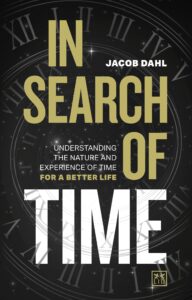|
Does time exist? by Jacob Dahl
By Guest Contributor Jacob Dahl
Author of In Search of Time, Jacob Dahl, explores whether time really exists.
Time is the most used noun in the English language, and it feels very present in our lives. We organize our days around time: we see friends, go to work and go to sports at a specific agreed-upon time. At a broader scale, we use exact timing to guide our airplanes, satellites, ships. Our GPS system is entirely dependent on understanding the detailed entities of time and our financial markets would not work without a shared notion and very precise measurement of time. In many ways, our ‘mastering’ of time is behind a significant part of the innovations, growth and prosperity that we enjoy as a civilization today. So why even ask the question if time exists?
Because if you start scratching the surface it becomes very hard to explain what it is, as Saint Augustine said almost 2000 years ago: “What then is time, if no one asks me, I know what it is. If I wish to explain it to him who asks, I do not know”. Despite all the scientific progress since then, we are still left with the big conundrum – we really don’t know what the real nature is behind one of the most prevalent pillars in our lives.
And the reality is that our concept of time is not only associated with good things. We all can feel trapped in the hamster wheel, we don’t feel we have enough time for our daily activities or even enough time on planet Earth to experience everything we aspire to. We also get frustrated with the short time horizons of business leaders and politicians; the climate crisis is a case in point.
So maybe it is worth exploring the nature of time a bit better to correct some of the frustrating time aspects in our lives.
Most perspectives on the topic of time are quite narrow in their nature. Physicists write about relative time and quantum time, philosophers investigate our perception of time, neuroscientists write about our brain’s manipulation of time, biologists look at our circadian clocks etc. The challenge is that time is such a multifaceted entity so we never get a full picture through one lens only, or as the scientist Carlo Rovelli says: “When we have found all aspects of time that can be spoken of, then we have found time”
In my book In Search of Time, I, therefore, tried to look at the nature and experience of time through 10 different lenses. Ranging from scientific angles such as physics, neuroscience, and biology to the evolution of the time aspect in history, art and business and also dealing with our religious, spiritual and psychological time perception. And let me start by saying that I can’t claim to have found the holy grail of time, and I seriously doubt if we will ever reach that stage. But the multifaceted approach has at least helped me to realize that time most likely does not exist as a physical entity, but it is so ingrained into our society, culture, beliefs and brains that it is impossible to let go.
In fact, it is with time a bit like it is with colors, we technically know it is just different electromagnetic wavelengths interpreted by our brains, but we still see them and we even agree on them. Or like temperature, which is really just how fast the particles are moving in a given object – but we feel warmth and coldness. We have macro models of the world, which are beautiful and useful but not necessarily linked to the true underlying nature of the phenomena. And so, we have probably created a nice macro model of time, which is not rooted in a real physical entity.
But unlike colors or temperature, our macro model of time has been under significant change since the Roman empire. The Romans not only gave us our modern calendar, but they also proliferated the time devices (mainly sundials and water clocks at the time) and the ancient rulers and emperors increasingly used time to control and advance society. The church accelerated this evolution during the Middle Ages. The industrial revolution built on (labour) time as a commodity, and our current ‘always-on’ society creates huge time efficiencies, but also a feeling that we never have enough time.
We have through the process distanced ourselves in the West from not only our predecessors but also many of the current Eastern and indigenous cultures. During my research, I interviewed a lot of non-Westerners and It is fascinating to learn how different their time experience is from ours, both when it comes to daily schedules and when it comes to larger aspects such as time on Earth, life and death. As humanity, we all share an idea of the color blue, but we no longer share a concept of time.
The question then is – if time is really not a rock-solid unchangeable physical entity, can we readjust our concept of time so we keep all the good aspects of time and avoid all the time traps that we have gotten ourselves into, especially in the West, both as individuals and as a society.
We know that long-term thinking in both business and politics pays off. Yet many leaders are optimizing for the next quarter or next election cycle. If time doesn’t really exist a climate crisis in the year 2100 is as bad as a climate crisis in 2025 and we should adjust our politics accordingly. And we are slowly starting to see interesting experiments of longer-term behavior such as the ESG related initiatives in the corporate world, and new ideas in policy setting such as having a future commissioner in Wales, who is tasked to look 30 years ahead. Or role plays in Japan with ‘representatives from year 2060’
Likewise running corporations according to a specific calendar (the ‘yearly wheel’) is creating a lot of additional work and probably not a lot of value. In a more ‘timeless’ world corporations react to real change, not to time per se. It was fascinating to see how both corporations and the public sector entities reacted to the Covid-19 crisis – real change was needed and go-to-market models and work models were changed in a matter of days and weeks. Innovation and agility went up 10-fold because it mattered.
On an individual level, we are craving more free time for ourselves. Only to realize that when we get more of it, we do not necessarily know what to use it for. Interesting research from the US shows that after a few hours of free time, getting more time has a negative impact. Time has no value in itself – it is what we do with time that matters.
So does time exist? – yes and no. Probably a no as a physical entity, but a very clear yes as a part of our lives. So, we better get the best out of our life-long friendship with time, and it seems that we can use a bit of readjustment in how we conceive time for the sake of ourselves and the sake of our society.
ABOUT THE AUTHOR

Jacob Dahl is a Senior Partner Emeritus at McKinsey & Co, a board member and investor. He has an MSc in Economics from Copenhagen University, has worked as a management consultant for 26 years and has lived in Denmark, Europe, Africa and Asia with his wife and four children. Jacob has always been passionate about history, philosophy and physics.
Suggested Reading
 In Search of Time looks at time through ten lenses in order to grasp a better understanding of it, as well as laying out the benefits of getting rid of our self-imposed bad time habits.
In Search of Time looks at time through ten lenses in order to grasp a better understanding of it, as well as laying out the benefits of getting rid of our self-imposed bad time habits.
